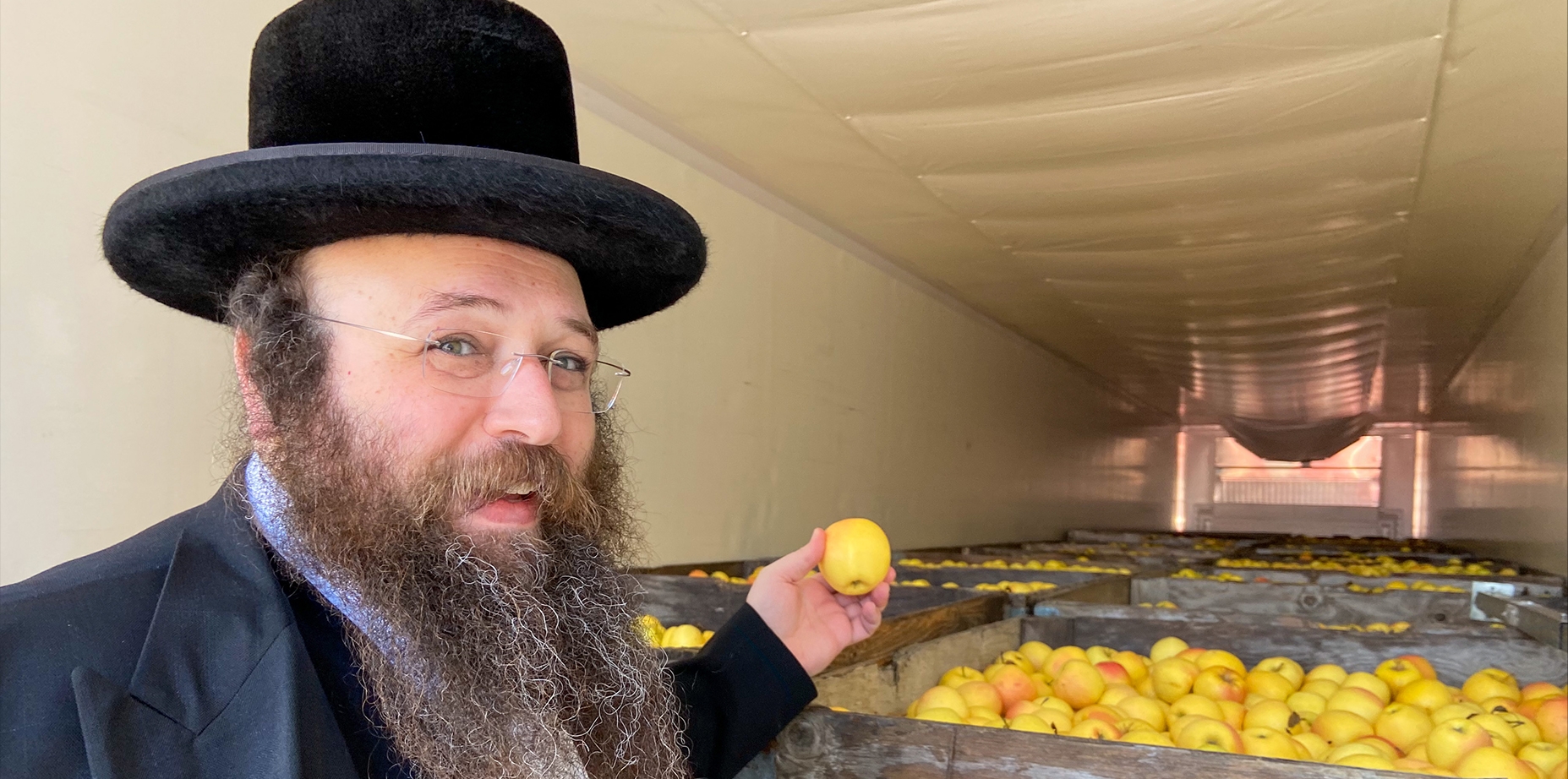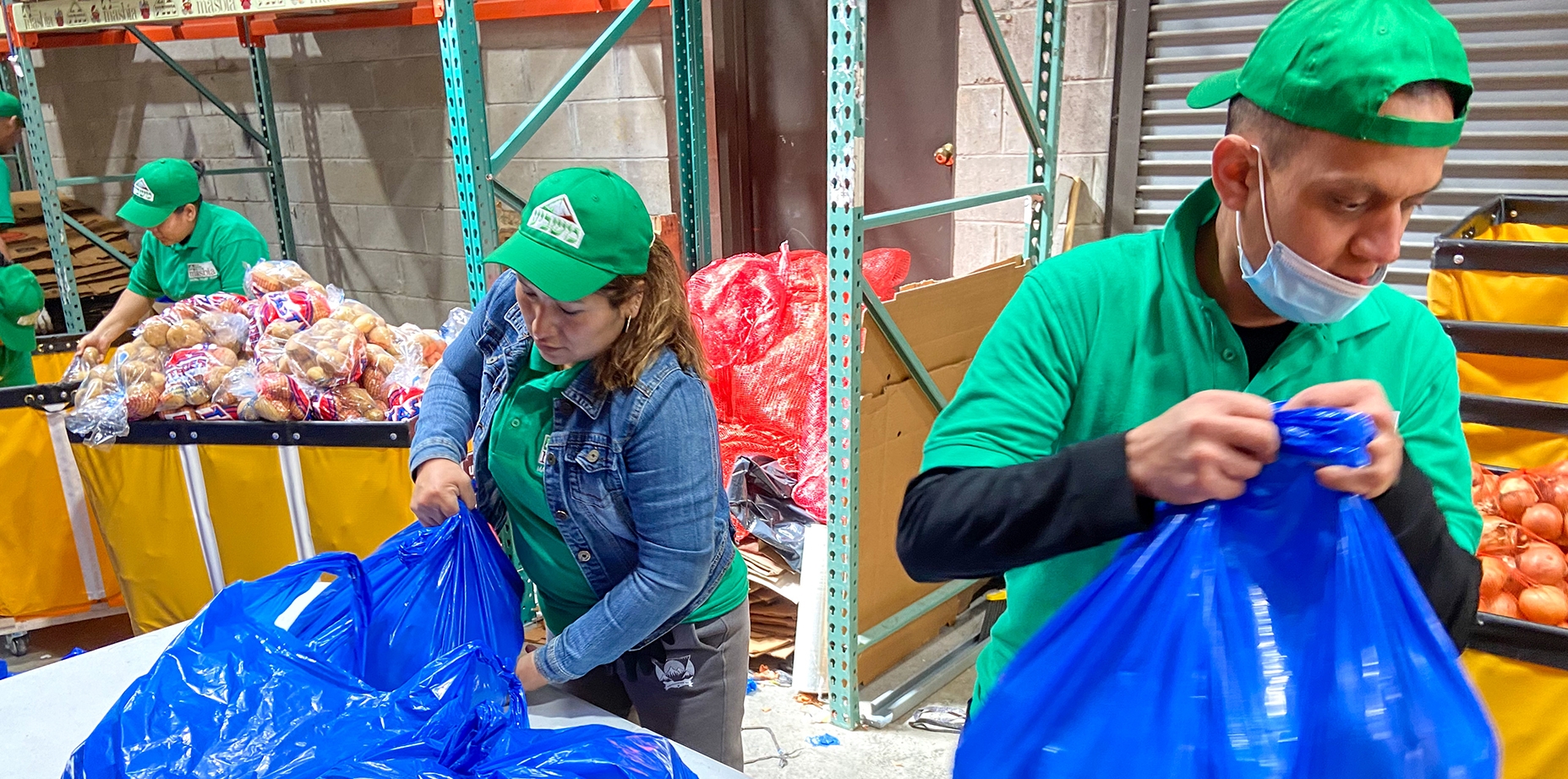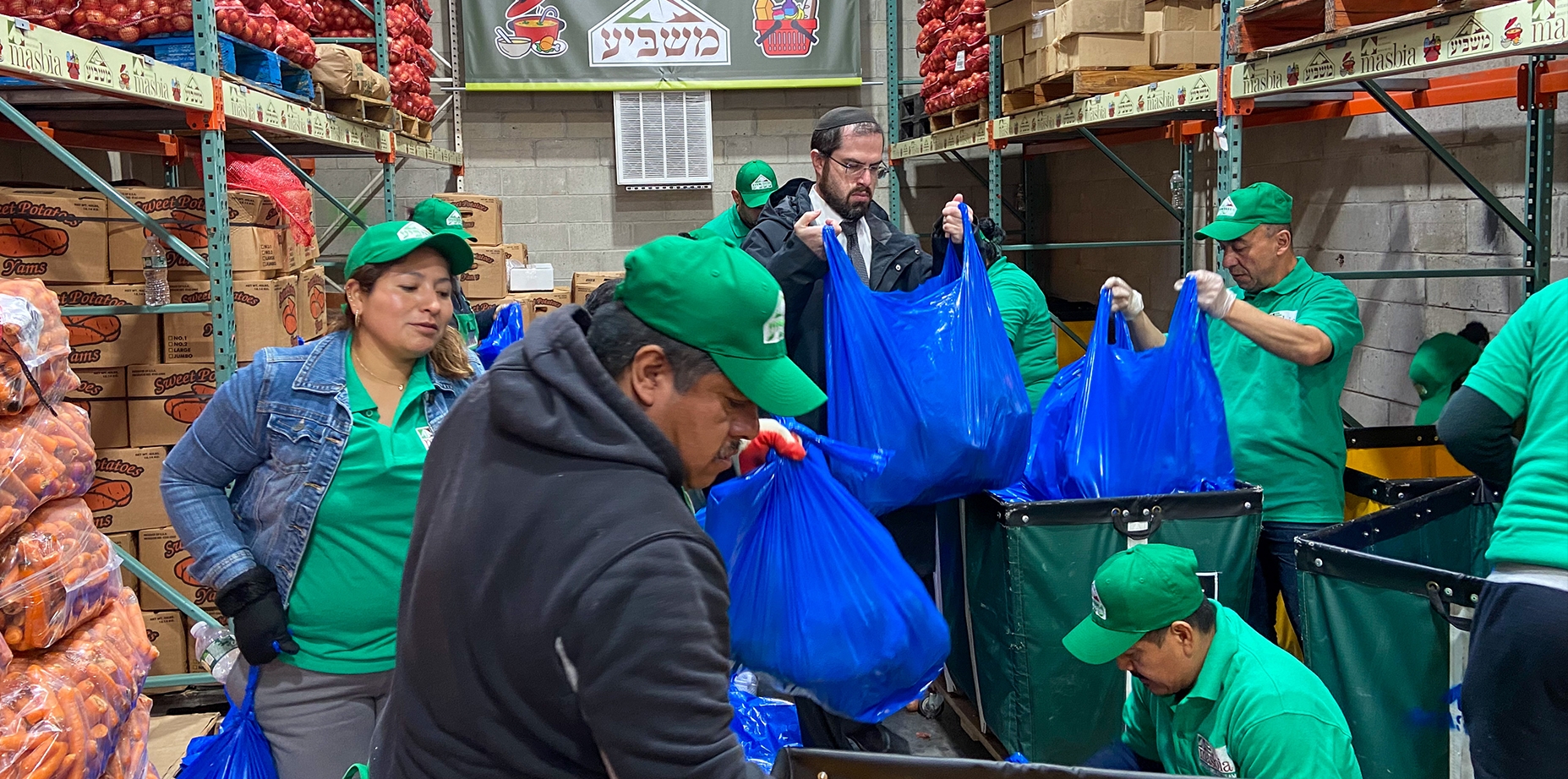(New York Jewish Week) — At a warehouse in Borough Park, thousands of apples were waiting to be taken off two 18-wheelers, as dozens of volunteers were hard at work putting groceries into bags.
The scene was one part of a massive $1.5 million operation undertaken every year by Masbia, an Orthodox organization that helps provide kosher food for low-income people, to distribute food for Passover to 10,000 families.
But this week, the Passover initiative differed from those of previous years. That’s because most of the people in the warehouse were migrants, the majority of whom were bused to New York from Texas during the past year. Because they are undocumented, they lack work permits, and for many of them, working in Masbia’s warehouse is their first job in the city.
Masbia was one of many organizations to welcome migrants who came from Texas when they arrived at the Port Authority last year, providing them with new shoes to replace pairs that may have broken down during long treks through jungles and other dangerous areas. The group’s executive director, Alex Rapaport, sees employing a group of migrants as another way to help them find their footing in the city.
“Sometimes, you need to turn over every stone to find a way to help people,” Rapaport told the New York Jewish Week.
Passover is the busiest time for Masbia, with hundreds of pallets of food coming in daily to the organization’s three warehouses in Brooklyn and Queens. At Masbia’s Borough Park location, boxes of potatoes and onions lined the sidewalk and stretched down the block. Inside the garage were piles of other Passover goods, stacked two stories high. Volunteers were busy picking produce off the shelves and putting it into bags for delivery drivers who were waiting near the entrance. The operation starts in December, and food distribution begins two weeks before Passover, which starts next Wednesday night.
“These people should have been given work permits,” Rapaport said. “They’re here, ready, willing and able to do beautiful work.”

Masbia CEO Alex Rapaport in front of a truck full of apples in Borough Park, Brooklyn on March 29, 2023. (Jacob Henry)
Rapaport combined the work with a touch of advocacy: Some of the volunteers working alongside the migrants were Jewish high school students, and Rapaport overheard one of them say that “illegal immigrants” were working there. He gathered high schoolers together and began to hold court.
“These people who are working are asylum seekers,” Rapaport told the teens. “They are fully designated as an asylum seeker, meaning to say, they are fully legal, because they have a day in court.”
Rapaport went on to discuss how if a person jaywalks, they are technically breaking the law, but are not referred to as “an illegal.”
“There’s never a person that turns into ‘an illegal,’” Rapaport said. “The term is just a very bad term. A person might not have documents, but these are people coming from the border who are looking for a new future. It’s an opportunity. They asked for asylum.”
The opportunity Masbia is providing comes via a partnership with La Colmena, a nonprofit that helps find jobs for day laborers, domestic workers and low-wage immigrant workers in from Staten Island.
Kimberly Vega, the workforce manager of La Colmena, told the New York Jewish Week that the group saw “an influx of asylum seekers” that began in August and is still ongoing. Vega has a list of 190 workers looking for jobs. Masbia provided work for 15.
“We’re facing this crisis at the moment,” Vega said. “We have the amount of workers, but we don’t have the jobs. They face all these challenges because they don’t have a permit or any documentation, so we’re very thankful for this opportunity that came up through Masbia.”
Vega added that many of the workers are staying in homeless shelters provided by the city in Staten Island. Many of the workers drop their kids off at school in the morning, then come to Brooklyn to work throughout the day. “They got shipped on a bus, arrived here and were transported to a shelter,” Vega said.
According to NPR, it’s estimated that up to 50,000 migrants were moved to New York over the past year by Texas Gov. Greg Abbott, a Republican. New York City Mayor Eric Adams, a Democrat, called Abbott’s actions “inhumane.”
In a New York Post op-ed published last August, Abbott wrote that Adams was hypocritical for calling New York a sanctuary city, then complained about the new arrivals.
On Twitter, Adams’ press secretary Fabian Levy wrote that the mayor is “welcoming asylum seekers with open arms.”
Vega said the migrants working at the Masbia warehouse were being paid based on a law that has been used to help undocumented workers earn income. According to the State Department of Labor, nonprofits may give volunteers stipends or reimbursements. Therefore, Vega said, even though a migrant worker is only a volunteer, they can still be paid by a nonprofit organization. Masbia and La Colmena would not disclose how much the workers were being paid.

Asylum seekers working at a Masbia warehouse in Brooklyn on March 29, 2023. (Jacob Henry)
Gledys, 30, a migrant working at the warehouse, told the New York Jewish Week that she came to New York from Venezuela after being bussed here from Texas last October.
Gledys, who did not give her full name for fear of her family being harmed, said through a translator that when she was living in Venezuela, “There’s a certain political view that everyone has to have.”
“If you even think differently, you can’t even speak amongst your community, because then they will turn on you,” Gledys said. “My husband was a police officer there, and because of that reason, we had to leave.”
When she arrived in New York, Gledys said she was “hit with the reality that it’s hard to find a job because you need certain permits.”
“I’m working really hard [at Masbia] and hoping this will open my doors,” Gledys said. “They’ll be able to see that I’m a hard worker and [I will] gain experience for more opportunities to open up.”
She added that she was thankful that her children were able to begin attending public school only a few days after she arrived. The city also helped provide daycare for her.
“No other country has done that,” Gledys said. “It’s more than enough. I’m not suffering, and I’m grateful. I’m definitely very hopeful because now I can see a different future for my children, a different future for myself.”
Another worker named Moises, 39, who likewise did not provide his full name due to fear for his family’s safety, said he came to New York from Venezuela via Texas in January after entering immigration custody.
“During those days, we were still cuffed and I was separated from my family,” Moises said. His wife and children eventually made it to New York, and they were reunited.
He said that in Venezuela, inflation was so rampant that he was only making $7 to $10 a week.
“People are really struggling,” Moises said. “There are also a lot of political issues as well. If the community tries to step up and do a protest, you have the military stepping in and shooting directly at civilians. We’re really running away, because we were so scared.”
He said he was worried about how he was going to feed his family, but was also thankful for the help they received when they first arrived, including finding a place to stay in a shelter, and now the job at Masbia.
“I want to feel independent,” Moises said. “With a job like this, I can be more independent. I understand it’s a temporary job, but hopefully in the next couple of months, I can find something that is no longer temporary.”
Rapaport feels that there’s a connection between the migrants’ stories and the holiday they’re helping prepare for because the Jewish people were also strangers in Egypt. “The Bible says, ‘You should love the stranger, the newcomer,’” Rapaport said. “There is that idea of people making a long journey to a promised land. These people went through the jungle.”
He added, “It’s beautiful to connect the Jewish story of Exodus to this story of the challenge of the asylum seekers.
“People take their whole family and go for thousands of miles through very dangerous terrain,” Rapaport said. “They must be running from something. It’s not utopia yet, but we’re celebrating some freedom. And they’re still in the middle of their story.”
The New York Jewish Week brings you the stories behind the headlines, keeping you connected to Jewish life in New York. Help sustain the reporting you trust by donating today.





